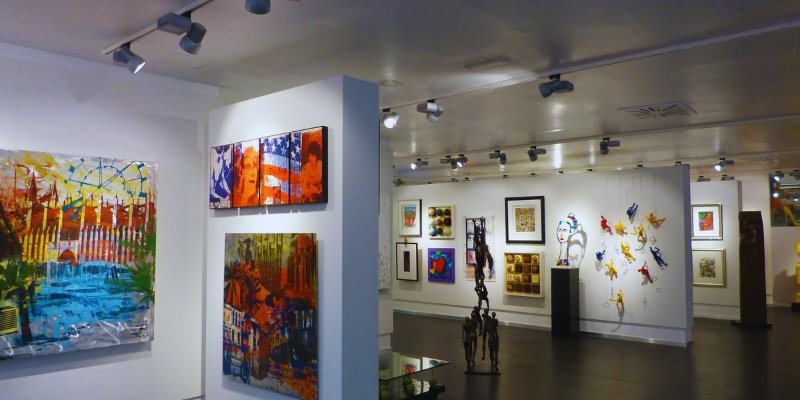Establishing a Heritage Art Preservation Studio Business in Singapore: A Guide for Aspiring Entrepreneurs

In a world where cultural heritage is increasingly at risk, the preservation of art and artifacts has become a vital concern. Singapore, with its rich multicultural history and vibrant arts scene, offers a unique opportunity for entrepreneurs to establish a Heritage Art Preservation Studio Business. This guide provides aspiring business owners with essential insights into starting and growing a successful studio dedicated to preserving the artistic legacy of the region.
Reasons to Start a Heritage Art Preservation Studio Business

Starting a Heritage Art Preservation Studio Business in Singapore is appealing for several reasons:
Cultural Significance: Singapore is home to a diverse array of cultural artifacts and artworks that reflect its unique heritage. With ongoing urban development and modernization, the need for preservation has never been more critical, creating a demand for specialized services.
Growing Interest in Heritage Conservation: As awareness of cultural heritage increases, so does the interest in preserving it. Individuals, institutions, and organizations are increasingly seeking professional services to maintain and restore their art collections.
Government Support: The Singaporean government actively promotes cultural preservation through various initiatives and funding opportunities. Entrepreneurs can benefit from grants and support programs aimed at fostering the arts and heritage sectors.
Networking Opportunities: The cultural community in Singapore is interconnected, offering numerous opportunities for collaboration with artists, museums, and cultural organizations. Building relationships within this ecosystem can enhance your business’s visibility and credibility.
Detailed Steps to Establish a Heritage Art Preservation Studio Business

Launching a Heritage Art Preservation Studio Business involves several critical steps:
Conduct Market Research: Begin by analyzing the local market for heritage art preservation. Identify your target audience, assess competitors, and explore trends to define your unique value proposition. Understanding the needs of potential clients will help you tailor your services effectively.
Develop a Business Plan: A comprehensive business plan is essential for outlining your mission, vision, target market, services offered, marketing strategies, and financial projections. This document serves as a roadmap for your business and can attract potential investors or partners.
Choose a Business Structure: Decide on the legal structure of your business. Options include a private limited company or a sole proprietorship. Each structure has different implications for liability, taxation, and regulatory compliance.
Register Your Business: Register your Heritage Art Preservation Studio Business with the Accounting and Corporate Regulatory Authority (ACRA) in Singapore. This process involves submitting necessary documents, including your business name, structure, and details of shareholders and directors.
Obtain Necessary Licenses: Depending on the nature of your services, you may need specific licenses or permits. Familiarize yourself with regulations governing conservation practices and ensure compliance with local laws.
Build a Skilled Team: Assemble a team of skilled conservators, restorers, and art handlers. A knowledgeable team will enhance your business’s capabilities and improve the quality of your preservation services.
Create a Portfolio: Start by working on a few sample projects to showcase your skills. A strong portfolio will help attract clients and demonstrate your expertise in heritage art preservation.
Market Your Services: Develop a marketing strategy to promote your Heritage Art Preservation Studio Business. Utilize digital marketing techniques, including social media, content marketing, and SEO, to effectively reach your target audience.
Challenges and Considerations for Both Local and Foreign Entrepreneurs

While Singapore offers a conducive environment for establishing a Heritage Art Preservation Studio Business, entrepreneurs may face several challenges:
Understanding Local Regulations: Navigating the regulatory landscape can be complex, especially for foreign entrepreneurs. It is essential to stay informed about local laws related to art preservation and cultural heritage.
Cultural Sensitivity: Understanding the diverse cultural dynamics in Singapore is crucial. Entrepreneurs must be sensitive to the various traditions and practices associated with different forms of art to ensure their services are respectful and inclusive.
Competition: The heritage preservation sector can be competitive, with numerous players in the market. Differentiating your services and creating a unique brand identity will be vital for attracting clients.
Technological Adaptation: The field of art preservation is continually evolving with new technologies and methodologies. Staying updated on advancements in conservation techniques and materials is essential for maintaining a competitive edge.
Financial Planning Aspects

Financial planning is a vital component of launching a Heritage Art Preservation Studio Business. Consider the following elements:
Initial Capital Requirements: Assess the costs associated with setting up your business, including equipment, materials, marketing, and operational expenses. Having a clear understanding of your financial needs will help you secure funding.
Funding Options: Explore various funding sources, such as government grants, sponsorships, and partnerships with cultural organizations. Singapore offers numerous support schemes for startups, which can alleviate financial pressures.
Revenue Streams: Identify potential revenue streams, including service fees for preservation projects, consultations, and educational workshops. Diversifying your income sources will enhance your business’s financial stability.
Budgeting and Forecasting: Create a detailed budget and financial forecasts to manage your expenses and anticipate future growth. Regularly reviewing your financial performance will help you make informed business decisions.
Conclusion
Establishing a Heritage Art Preservation Studio Business in Singapore presents an exciting opportunity to contribute to the preservation of the nation’s cultural legacy. By following the outlined steps and addressing potential challenges, aspiring entrepreneurs can successfully navigate this rewarding industry.
If you are ready to embark on this meaningful journey, Company Formation Specialist is here to assist you. Our expertise in corporate services and understanding of the Singaporean market can streamline the establishment process for your Heritage Art Preservation Studio Business. Contact us today to learn more about how we can support your entrepreneurial vision and help you succeed in this vital sector.
Frequently Asked Questions
1. What is a Heritage Art Preservation Studio Business?
Answer: A Heritage Art Preservation Studio Business focuses on restoring, conserving, and maintaining cultural artifacts, artworks, and historical items to ensure their integrity is preserved for future generations.
2. Why is Singapore a good place to start a Heritage Art Preservation Studio?
Answer: Singapore’s rich multicultural history and the government’s strong support for cultural preservation make it an ideal location for this business. The growing awareness of heritage conservation also increases demand for these services.
3. What are the steps to starting a Heritage Art Preservation Studio in Singapore?
Answer: Key steps include conducting market research, developing a business plan, selecting a legal structure, registering the business with ACRA, obtaining necessary licenses, building a skilled team, creating a portfolio, and marketing your services.
4. What challenges do local and foreign entrepreneurs face in this industry?
Answer: Entrepreneurs may face challenges such as understanding local regulations, cultural sensitivity, competition in the industry, and adapting to new technologies in art preservation.
5. What financial aspects should I consider when starting this business?
Answer: Consider initial capital requirements, explore funding options like government grants, project potential revenue streams (e.g., service fees, workshops), and budget for future growth.
6. How can I find funding for my Heritage Art Preservation Studio?
Answer: Funding options include government grants, partnerships with cultural organizations, sponsorships, and loans. Singapore offers various startup schemes to support small businesses in the arts sector.
7. Do I need specific licenses to run a Heritage Art Preservation Studio in Singapore?
Answer: Yes, you may need specific licenses or permits depending on your services. Ensure compliance with local laws and regulations related to art preservation and conservation.
8. What skills are required for a successful Heritage Art Preservation Studio?
Answer: A skilled team of conservators, restorers, and art handlers is essential. Expertise in preservation techniques, understanding materials, and attention to detail are key to providing high-quality services.
9. How can I differentiate my Heritage Art Preservation Studio from competitors?
Answer: Focus on creating a unique brand identity, showcasing expertise with a strong portfolio, and offering personalized services that cater to the specific needs of clients in the heritage sector.
10. What are the potential revenue streams for a Heritage Art Preservation Studio?
Answer: Revenue streams include service fees for preservation and restoration projects, consultations, educational workshops, and potentially selling preservation-related products or services.

